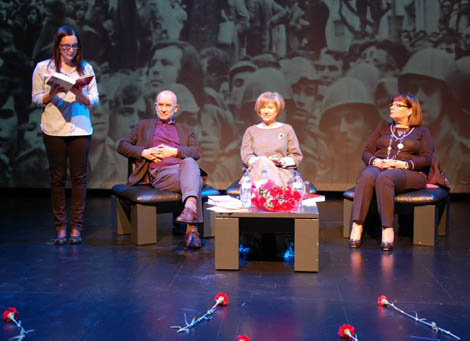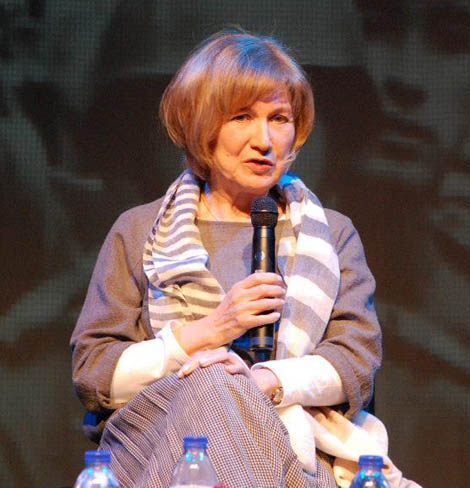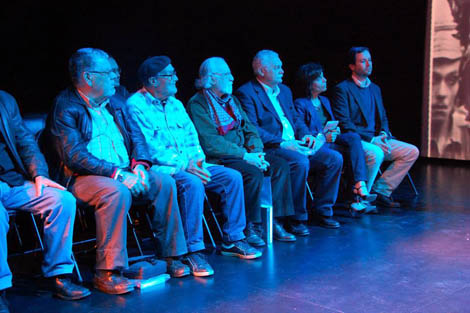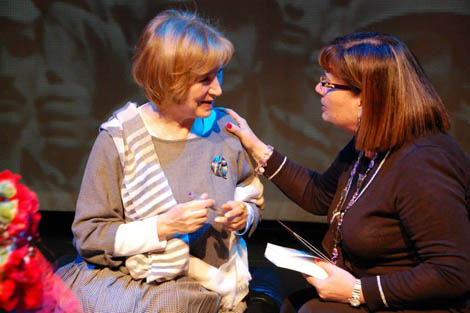 It was supposed to be a conversation about the most recent book by Lídia Jorge, but it turned out to be above all a conversation about the 25th of April 1974 and the memories – and myths – that we keep from that «founding day».
It was supposed to be a conversation about the most recent book by Lídia Jorge, but it turned out to be above all a conversation about the 25th of April 1974 and the memories – and myths – that we keep from that «founding day».
On the black stage of the main hall of the Municipal Theater of Portimão (Tempo), against the backdrop of an iconic photo of 25A, the sea of people in Largo do Carmo, 80 chairs were placed facing the place where the writer sat. Lídia Jorge, theater director João Ventura and Chamber president Isilda Gomes. On the ground, 10 red carnations. When you entered, the background noise, which almost overcame the conversations, was that of footsteps in the gravel that starts “Grândola”, by Zeca Afonso.
And it would be with this song, also iconic, that the session would begin. Most of the people, and even Lídia Jorge, sang it, more or less silently, some with their eyes downcast and their faces closed, others with a smile on their faces. An old communist militant, seated in the front row, looked at the person next to him and said: "who was to say that they were still going to sing Grândola like that…".
The motto for the conversation was set, which would bring together almost 80 people for more than an hour and a half, at the beginning of the evening of Friday, the 28th.
Isilda Gomes, mayor of Portimão, began by saying that the setting and the music reminded her of “my youth, our hope for the future, in being able to build a society different from the one we are living. Four decades have passed and we are still on this poverty line…»
And the mayor concluded: «the presentation of this book by Lídia Jorge is the best way to start celebrating the 40th anniversary of the 25th of April in Portimão».

It was then the turn of Susana Martinho Lopes, from the Tempo team, to read a first excerpt of the novel “Os Memoráveis”, after all, the reason for the existence of that gathering. A book that conjures up a certain memory of 25A, no longer of historical and factual truth, but of what five key men of the revolution remember. On the pages of “Os Memoráveis” pass, for example, Otelo, Vasco Lourenço, the widow of Salgueiro Maia, whom a group of young journalists will interview to gather their testimony, almost 40 years later.
João Ventura, director of Tempo, an avid reader, asked Lídia Jorge the first question: "Did you write the book for an ethical imperative?"
Lídia Jorge would explain that this is not a nostalgic book of a certain innocence and lost purity. «Memorables seems to be a memory of the past, an epithet that means we are going to dig up the past, but it is rather a past revised because it is projected into the future. Memorable is the future, that which in the future is worthy of our memory, which goes from the present to the future».
The theme of her novel, added the writer, "is born of time itself", and, in that sense, "it is not a political book, it is not a pamphlet book". "It is not to say that the military saved us, it is not to say that we need another revolution, it is not to demonstrate, much less to show, to show how it happened, how hope was lost in some points and remained in others."
Ethic? «It is not to open the door and say: this is how it is done! I don't know how it's done! It is to say: look how it was done. Adding a change to the future and, in that sense, it is profoundly ethical».
It's just that, added Lídia Jorge, “if it's just a political book, it's not much! I wanted a literary book, where ethics is just one of the ribs of the skeleton».
João Ventura returned to the charge: «is this what literature is for? Does it serve to wake up history and put an end to the modern obsession of oblivion?”
«When I started writing, I was pushed by sadness: we who dreamed of being a country with a voice in the world have a rope in our throat». He wanted to "make society wake up and be a teenager again, without fear of anything", stressed the author.
Why don't young people find a new song?
 And here came a reflection on the current “use” of the song “Grândola”, as a symbol of protest by current generations. "A year or so ago, people started to sing Grândola as a protest." Because “young people weren't able to find a new song, they went back to this one”, said Lídia Jorge.
And here came a reflection on the current “use” of the song “Grândola”, as a symbol of protest by current generations. "A year or so ago, people started to sing Grândola as a protest." Because “young people weren't able to find a new song, they went back to this one”, said Lídia Jorge.
In response, first came the testimony of Damião Sequeira, a retired professor, who in 1974 was in Germany. He recalled the importance of "Grândola" as a symbol of the 25A Revolution, even abroad, and the time that José Afonso refused to sing it in a session in Germany, not wanting to "banalize".
Then came the serene but strong intervention of 27-year-old Pedro Pinto, the only young man present at that conversation. “Where is my generation? Why is it that, when I participate in things like this, I'm always the youngest?” he asked. Because, he replied, "for my generation, freedom is something acquired". But “what does my generation do with this freedom? He wastes it and walks distracted». However, freedom, said the young Pedro Pinto, served "so that today I could be here with this microphone to say what I think".
Lídia Jorge was moved by the words of this young man and replied: «in the book there is a passage in which Salgueiro Maia – through the mouth of his widow – says: how happy would be the day when young people no longer need to remember the 25th of April!".
 “Memory is a funnel. We cannot pass on to the youngest all our memories, just a part of them». But 25A was “a founding day and that day founded the freedom of this young man”.
“Memory is a funnel. We cannot pass on to the youngest all our memories, just a part of them». But 25A was “a founding day and that day founded the freedom of this young man”.
Memory, insisted Lídia Jorge, is “a funnel”. «We have our memory, but we are going to start to taper, to taper», until we arrive at a version of history that, more than a synthesis, is already pure construction. "Even people my age are deleting many of the names that made the 25th of April, they only remember the loudest names."
Therefore, said the writer, “this book is not historical, it just drinks from history. This book aims to meet a mythology», the mythology that years of memory created about 25A. The characters in “Os Memoráveis” are, concluded Lídia Jorge, “figures that appear not in their historical truth, but in their mythological truth”.
Perhaps it is, as Camões, who also wrote about other Portuguese myths, said, a book about "those who, through worthy works, go away from the law of death by liberating".
Veja more pictures here.


















Comments